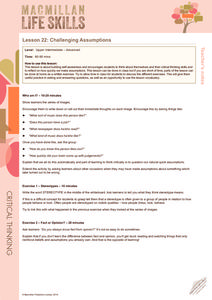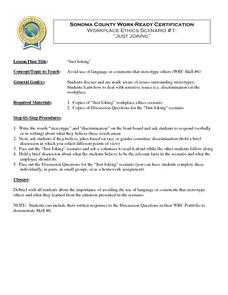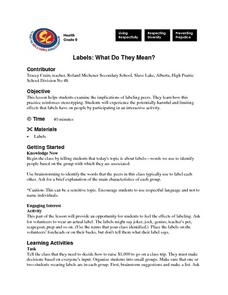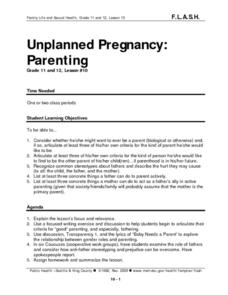Childnet International
Responding to Cyberbullying
After watching a short video about cyberbullying, individuals play an online cyberbullying game and then create their own Digizen that expresses their values and presents their vision for themselves, their friends, and the world at large.
Peace Corps
Introducing Culture
Growing up within a culture leaves a lot of ideas and values unspoken. Take a closer look at the cultures in which your learners live with a discussion activity that addresses cultural identity and traits of those living within the...
Museum of Tolerance
Developing Media Literacy
To protect young people from questionable content, many schools limit access. This resource suggests that because learners can so readily avail themselves to unrestricted Internet access, it is vital for 21st century learners to develop...
Ontario
Critical Literacy—Media Texts
Media texts convey both overt and implied messages. As part of their study of media, class members analyze the language, form, techniques, and aesthetics in a variety of media texts.
Media Smarts
Thinking About Television and Movies
As part of their study of the influence of TV and films, class members consider how music, lighting, costumes, camera angles, etc. are used to influence the response of viewers.
Media Literacy
Once Upon a Time
Robert Munsch's The Paperbag Princess and Jon Scieszkafrom's The True Story of the Three Little Pigs launch a discussion of the role of stereotypes in stories and movies.
Media Awareness Network
Images of Learning: Elementary
Tired of 20-somethings portraying high school students? Tired of athletes and principals always being the villains? Class members examine the student and teacher stereotypes presented TV shows and films that are et in schools.
University of the Desert
What Are the Possible Causes of Cultural Misunderstanding?
Why do cultural misunderstandings happen? What causes stereotypes, and what is dangerous about them? After viewing some possible explanations to these questions provided by young adults around the world, your learners will discuss how...
Sunburst Visual Media
Respect: It Starts With You!
There are few things as frustrating to a teacher as a disrespectful student. Luckily this collection of activities, worksheets, and writing exercises is here to help eliminate this problem by teaching young leaners what respect really...
Macmillan Education
Challenging Assumptions
After experiencing how quick and easy it is to make judgments as part of an opening activity, learners discuss the concept of a stereotype and the need to think critically and question our immediate assumptions.
Crafting Freedom
F.E.W. Harper: Uplifted from the Shadows
What is stereotyping, and how do we handle stereotyping in our daily interactions? Your young historians will not only have the opportunity to learn about the first African American woman to publish a short story–Frances Ellen...
Crafting Freedom
F.E.W. Harper: Uplifted from the Shadows
Young historians discover the life of an incredible African American woman who, as an anti-slavery lecturer prior to the Civil War, defied stereotypes of what women could accomplish. Pupils explore the concept of stereotyping, read...
My Career Space
Just Joking
After reading a workplace ethics scenario regarding an employee who makes racially insensitive comments, your learners will discuss how language that stereotypes others is discriminatory and never "just joking."
Curated OER
Gender Stereotypes and Body Image
Students discuss and become aware of the dangers of gender stereotyping and the media's role in perpetuating gender stereotypes. They view magazine advertisements and make entries in their journals after guided discussion.
Curated OER
"Bursting" Stereotypes
Students comprehend the meaning of the word steretype, work in groups to come up with stereotype statements, discuss whether the statements are fair, and write what they learned from the activity. Balloons are used as a conduit in this...
Media Smarts
The Impact of Gender Role Stereotypes
One of three lessons on gender stereotype, this resource from the Media Awareness Network discusses the violence that is inflicted on men and women as they try to live up to the stereotypes of their gender. The section on women focuses...
Media Smarts
First Person
High schoolers explore the relationship between video games and actual population. Example: A 2005 study showed Latino youth play at higher rates than other groups, but there are no Latino playable characters. They watch a brief video...
Curated OER
Stereotypes in The Diary of Anne Frank
Before reading Anne Frank's diary, discuss stereotypes with your class. This guide is a great prereading activity; pupils complete a list of incomplete sentences in order to showcase common stereotypes. Then, they complete the seven...
Curated OER
Understanding Stereotypes
Pupils confront age-related stereotypes, explore how stereotyping impacts their lives, and discuss how they can make changes to reduce over-generalizations, unfair assumptions, and critical judgments about people groups. They use a...
Curated OER
Generalizations: How Accurate Are they?
Work together to evaluate the accuracy of generalizations. Examine the effects of cultural stereotyping based on generalizations. Students will engage in a class discussion aimed at answering the question, "What are some ways we can...
Curated OER
Labels: What Do They Mean?
Ninth graders brainstorm words they typically use to label each other, discuss effects of labeling, including reinforcement of stereotypes, and experience potentially harming and limiting effects that labels have by participating in...
Curated OER
Interpreting Perspective
Work on characterization with a narrative writing lesson, in which middle schoolers interpret a character's perspective. They discuss family traditions and examine how culture can influence a character's perspective. Next, they read...
Curated OER
Unplanned Pregnancy: Parenting
High schoolers consider and discuss characteristics of an ideal parent. In small groups, they work together to examine the stereotypical roles of the father and the mother. The issues dealt with in this resource are thought-provoking and...
Curated OER
CAN WE SWITCH GENDERS OF STORY CHARACTERS?
Analyze characters and stories to identify stereotyping. Learners will examine the concept of character gender to evaluate bias in classroom story books. They are asked to read a story or play and change the gender of the character to...

























